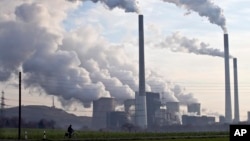Heads of state from 125 countries will join leaders from business and civil society next week for the largest United Nations Climate Summit since 2009.
While the top leaders from China, Russia and India will not attend, their delegates will be on hand. U.N. Secretary General Ban Ki-Moon has called climate change a "defining issue of our time" and has urged the political leaders of the world “to prioritize their resources and their political energy on climate change."
The secretary general has also challenged leaders to take bold new steps to avoid the impending consequences of a warmer world: a rising sea level, more frequent and violent storms, and increased risk of drought.
Funding the fight
Helping countries prepare themselves financially for a changing climate is also likely to prove a key topic.
For countries such as the Marshall Islands in the Pacific Ocean, for example, climate change is not a distant threat but a day-to-day reality. That money would likely come from the U.N.'s Green Climate Fund, set up for poor countries in 2009.
Although Germany stepped up this year with a $1 billion contribution, the fund remains well below the $15 billion in expected contributions for 2014.
According to Jennifer Morgan, head of the Climate and Energy Program at the World Resources Institute, pledges from even two or three other major economies would be considered a success.
“I think that if we were to see a couple of those, then you’re starting to see at least a down-payment there,” she said.
Better economy
According to recently published report by the Global Commission on the Economy and Climate, $90 trillion will be invested in urban development, land use and energy systems by 2030.
Exactly how those funds are managed will shape future economic productivity and living standards, says World Bank Vice President Rachel Kyte, who serves as special envoy for climate.
Kyte argues for a business model that ties responsible action on climate to economic growth.
“The most powerful move that a government can make in the fight against climate change and the re-engineering of the economy towards greater efficiency is to put a price on carbon," she said. "The right price on carbon will drive investment away from brown and toward green, away from jobs which will disappear toward new jobs for the new generation.”
New climate treaty
Kyte says the strategy is already is gaining momentum as countries, states and provinces adopt new targeted taxes and cap carbon emissions and create carbon trading markets.
Prospects for expanding those policies will be a major theme at the summit, she added, explaining that it's cheaper act in the short-term, rather than wait to tackle challenges as they arise.
“These are investments in a healthier, safer .... less expensive future," she said. "Less expensive because it has become very clear that the longer we wait to address climate change, the more expensive dealing with the damage and lowering the emissions will become.”
Observers hope that attention to the issue at the U.N. Climate Summit will lead to strong support for a comprehensive global climate treaty, to be adopted in Paris next year.




